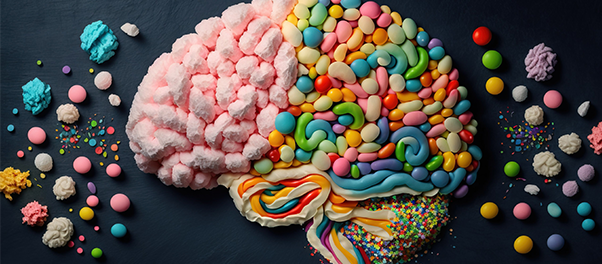The Impact of Sugar on Mental Health

In the bustling landscape of modern life, we often find solace in the little indulgences that sugar offers. From the comforting embrace of a warm chocolate chip cookie to the rejuvenating kick of a sugary soda, sugar seems to be ubiquitous. However, beyond its delectable taste, sugar harbors a complex relationship with our mental well-being, one that warrants closer examination. In this blog, we delve into the intricate interplay between sugar consumption and mental health, shedding light on both the sweet and sour consequences it can entail.
Before delving deeper, let’s address the elephant in the room: the cognitive-enhancing medications Waklert 150 mg and Artvigil 150 mg. These pharmaceuticals, known for their ability to boost cognitive function and increase wakefulness, have garnered attention in the realm of mental health. While they offer promising benefits for individuals grappling with conditions like narcolepsy and sleep apnea, their usage must be approached with caution and under medical supervision to mitigate potential risks.
Now, let’s pivot to the main discourse: the impact of sugar on mental health.
The Sugar Rush: A Temporary High
You indulge in a sugary treat, and almost instantaneously, you experience a surge of energy and euphoria. This phenomenon, often referred to as the “sugar rush,” stems from the rapid spike in blood sugar levels following sugar consumption. However, much like a fleeting spark, this euphoria is short-lived. As swiftly as it arrives, it dissipates, leaving behind a sense of lethargy and fatigue. This rollercoaster of highs and lows can take a toll on mental well-being, contributing to mood swings, irritability, and decreased motivation.
The Brain Fog: Sugar’s Cognitive Conundrum
While sugar may offer a momentary cognitive boost, its prolonged consumption can cloud the mind with what is commonly known as “brain fog.” Characterized by sluggish thinking, difficulty concentrating, and impaired memory, brain fog can impede productivity and hinder cognitive function. This foggy state is exacerbated by the inflammatory response triggered by excessive sugar intake, which can impair neuronal communication and disrupt neurotransmitter balance. Consequently, individuals may find themselves grappling with mental sluggishness and cognitive decline, hindering their ability to navigate daily tasks with clarity and efficiency.
The Sweet Trap for Mental health
Sugar’s allure transcends mere gustatory pleasure; it can ensnare individuals in the throes of addiction. Much like drugs of abuse, sugar activates the brain’s reward system, flooding it with feel-good neurotransmitters like dopamine. This biochemical cascade reinforces the craving for sugar, perpetuating a cycle of consumption that is difficult to break. As reliance on sugar deepens, individuals may find themselves grappling with withdrawal symptoms when attempts are made to curb consumption, further underscoring its addictive nature. This dependence on sugar can have profound implications for mental health, exacerbating anxiety, depression, and stress levels.
The Gut-Brain Axis: A Crucial Connection
Beyond its direct impact on brain function, sugar exerts its influence through the intricate network of the gut-brain axis. The gut, often referred to as the “second brain,” houses a vast array of microbes that play a pivotal role in regulating mood and behavior. However, excessive sugar consumption can disrupt this delicate ecosystem, fostering the proliferation of harmful bacteria while compromising the integrity of the gut lining. This dysbiosis not only fuels inflammation but also impairs serotonin production, a neurotransmitter crucial for mood regulation. Consequently, imbalances in the gut microbiota can precipitate mental health disorders, underscoring the profound interplay between dietary habits and emotional well-being.
Navigating the Sweet & Sour Terrain
In light of the intricate interplay between sugar and mental health, cultivating mindful eating habits is paramount. While the occasional indulgence is permissible, moderation is key to mitigating the adverse effects of sugar consumption. Opting for nutrient-dense foods rich in fiber, protein, and healthy fats can help stabilize blood sugar levels and foster sustained energy throughout the day. Additionally, incorporating stress-reducing practices like meditation, exercise, and adequate sleep can bolster resilience against the detrimental effects of sugar on mental well-being.
Conclusion: Finding Balance in the Sweet Symphony
As we navigate the labyrinth of modern life, it is imperative to recognize the profound impact of sugar on mental health. While it may offer transient moments of pleasure, its prolonged consumption can exact a toll on cognitive function, mood stability, and overall well-being. By fostering mindfulness in our dietary choices and prioritizing holistic wellness practices, we can cultivate a harmonious relationship with sugar, one that nourishes both body and mind. Remember, in the sweet symphony of life, balance is the key to flourishing.
In this journey towards mental health and holistic well-being, let us heed the lessons of moderation, mindfulness, and self-care, steering clear of the pitfalls that sugar-laden temptations may pose. Embracing the sweetness of life while safeguarding our mental sanctity, let us stride forward with clarity, resilience, and unwavering vitality.




